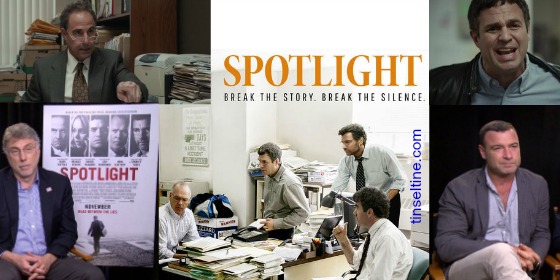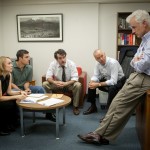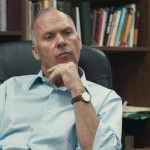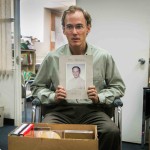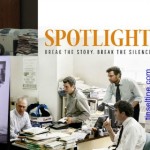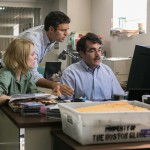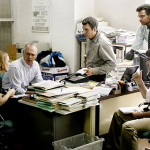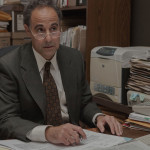omertà ˌəʊmɛːˈtɑː,Italian omerˈta/ noun
There is a sequence in Spotlight in which Rachel McAdams‘s Sacha Pfeiffer knocks on a door and finds herself talking to one of the former priests on her list. Much to her surprise he readily admits to playing with young boys in his care, but assures her that he took no personal satisfaction. It was OK because he did not rape them, the priest says, as he was raped as a young boy – before his sister warns off the reporter and slams the door. You fear for our children that this attitude was ever the norm.
The true story is that this culture of sexual abuse went back Centuries, and was not merely limited to a few bad apples but thousands of clerics right across the globe (as opposed to The Globe) – which Holy Sees are helpfully listed at the end of the film. The unseen psychotherapist and ex-Benedictine monk Richard Sipe is quoted as estimating the proportion of paedophiles among the priesthood to average 6%, with 50% said to be ignoring vows of celibacy. The sheer scale is beyond anything the team investigating this very human tragedy could ever have realised, provoking a reaction akin to cognitive dissonance, almost like uncovering a holocaust when you were looking for one grave.
Spotlight makes for a powerful, compelling companion piece to Mea Maxima Culpa, the extraordinary documentary covering abuse by paedophile priests and the cover-up traced all the way to the Vatican. The revelation is that even Joseph Ratzinger, later Pope Benedict XVI, is implicated. The then “Holy Father,” you will recall, retired early once the spotlight came to rest on his role in moving on priests who were serial offenders rather than ensuring all details were passed to the police to allow prosecution.
I’ve also heard Spotlight described as All The President’s Men, substituting the Catholic conspiracy of silence for Watergate and the White House, here focusing on the investigative journalism of a select “spotlight” team at the Boston Globe, lapsed Catholics to a man and woman.
Like its Oscar-laden predecessor, Spotlight could have resorted to wordy hand-wringing complete with histrionics and Hollywood schmaltz, but instead becomes an intimate, intense, understated drama on breaking the seal of secrecy held by the church over the city of Boston, its lawyers and press alike – but, worst of all, an air of intimidation held over victims and others who knew its dirty little secret but said nothing.
The air of quiet claustrophobia adds greatly to the success of this movie, and helps greatly to provide light and shade, making it all the more credible when the passion of reporter Michael Rezendes (Mark Ruffalo in fine form) spills over into a rant because the story about one priest is not be printed immediately.
We know in advance that the Globe team succeeded, so the crux of the movie is how the team were able to play the cat-and-mouse game, prise a story from the facts and win admissions of guilt from the Church. The irony is that much of the relevant information had already been in the hands of lawyers and indeed the Globe from some years previously, but had been buried. It is slow-talking new editor and, as a Jew, an outsider, Marty Baron (Liev Schreiber), who provokes what had been considered a minor story into the biggest coup the paper had achieved in years.
Where one lawyer, Eric Macleish (Billy Crudup) has settled many cases and studiously avoids giving Michael Keaton‘s phlegmatic senior reporter (“I think of myself as a player-coach”) Walter “Robby” Robinson any information indicating a systemic issue going right to the very top (in this case, Cardinal Bernard Law, played with zest by Len Cariou); the other, Stanley Tucci‘s sadly cynical and hard-working Armenian Mitchell Garabedian, doubts anything will come of the investigation but provides many key leads along the way.
I also liked Neal Huff‘s Phil Saviano, a survivor of abuse and leading light in SNAP, a group gathering together survivors, some of whom are still raw and emotional about their experience. They are widely dismissed as head cases, but speak with passion and authenticity. This kind of acting is where The Method comes out strongest – bringing out the traumatic experience people have lived through to create shining, credible characters.
Director Tom McCarthy and co-writer Josh Singer have created an astonishing heavyweight script, one worthy of its Oscar. No finer raw material could be presented, though McCarthy coaxes from a fine ensemble cast performances worthy of that script.
It’s worth taking Michael Keaton as a prime example. I had never considered Keaton a serious actor worth his salt, yet in two weeks I’ve seen a remarkable and flashy performance in Birdman and now an even better performance in Spotlight. What I like about his Robinson is that world-weary downbeat cynicism has not quashed the idealistic reporter in him.
He can spot a story, but his internal debate contrasts the tingle of excitement with the benefit of experience and avoiding the cardinal sin (no pun intended) of going in all guns blazing to let the Church squash the story before the evidence has been gathered – all the more so since he has trigger-happy contacts within the church and their lawyers, people who constantly remind him that the church does good work and should not be brought down because of a few “bad apples.”
He keeps his bullish reporters Pfeiffer and Rezendes in check until they have amassed damning evidence (the McGuffin being incriminating documents linking Cardinal Law to the cover-up), sufficient to satisfy Baron and the other senior editor Ben Bradlee Jr (Mad Men‘s John Slattery) that their backs are protected. At the same time he has to keep the scoop under wraps to prevent The Boston Herald getting in first and stealing their thunder – a difficult balancing act.
I came out of seeing Spotlight remembering an interview I’d seen with a senior official of the Catholic church dismissing the child abuse scandal by saying it all happened decades ago, but since silence reigns and transparency is certainly not the norm, you never know what might or might not be covered up.
This may not be a film you would choose to watch for entertainment, and indeed many might run a mile to avoid the subject matter, but I’d urge you to curb your sensibilities and watch what is an important picture, a film rarely and truly worthy of its Best Picture Oscar.

